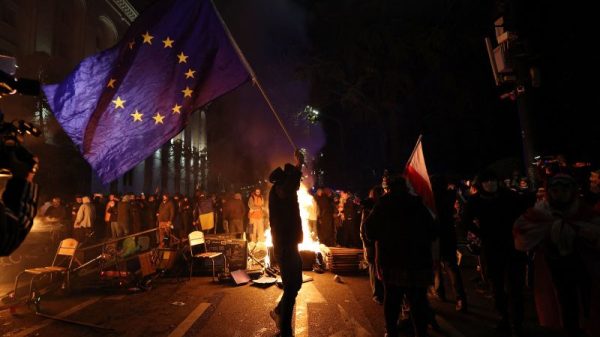Georgia has been rocked by protests after its increasingly autocratic government said it would halt the former Soviet country’s bid to join the European Union.
The ruling Georgian Dream party, which claimed victory in last month’s election that observers said was fraudulent, announced on Thursday that it would suspend accession talks with the EU until 2028.
Its decision quickly sparked protests in the capital, Tbilisi, where demonstrators were heard chanting “Russian slaves” at police officers guarding the parliament building.
The protests were eventually put down early morning Friday. Police fired water cannons and tear gas at protesters, while men wearing balaclavas were seen running into the crowds and beating individuals.
Salome Zourabichvili, the country’s pro-Western president whose powers are mostly ceremonial, claimed that the police “targeted journalists and political leaders.”
The protests are part of the ongoing fallout from the country’s October 26 parliamentary election, which was seen as a referendum on alignment with Russia or the West. After years of moving closer towards Europe – and securing EU candidate status late last year – Georgian Dream has taken a sharp authoritarian turn. In May, it forced through a Kremlin-style “foreign agent” law, which critics say aims to shut down watchdogs who call the government to account.
Georgian Dream claimed victory with 54% of the vote, but opposition parties claimed the election was rigged. Zourabichvili also appealed the results to the country’s Constitutional Court.
Earlier Thursday, the European Parliament rejected the outcome of the election and called for a re-run to be held within a year. It said the vote was “neither free nor fair” and was another instance of democratic backsliding in Georgia, “for which the ruling Georgian Dream party is fully responsible.”
Hours later, Georgian Prime Minister Irakli Kobakhidze said his government would remove EU talks from its agenda and refuse the bloc’s budgetary grants until 2028, accusing some of the bloc’s politicians of “blackmail and manipulation.”
During the election campaign, Georgian Dream repeatedly assured voters it was committed to pursuing EU membership, which polls show more than 80% of Georgians support.
Protesters in Tbilisi said that, while many doubted the sincerity of Georgian Dream’s commitment to joining the EU, they were shocked that it changed its course so soon after the disputed election.
Ketevan Chachava, a non-resident fellow with the Democratic Resilience Program at the Center for European Policy Analysis (CEPA), said she was surprised the mask had dropped so quickly.
Tsotne Jafaridze, a winemaker who lives in Tbilisi, said the police response to Thursday night’s protests was exceptionally brutal.
Salome Khvaratskelia, a nurse, said the police had used new equipment to disperse the crowds. Shortly before the election, Georgia’s interior minister announced the government had purchased several new water cannons to bolster the riot police.
Tbilisi has been regularly rocked by protests in recent years in response to moves by Georgian Dream, particularly over the “foreign agent” law, which critics say was a copy of legislation passed by Russian President Vladimir Putin.
But the government’s halting of the country’s EU bid appears to have sparked the protest movement into life. Demonstrations are expected to resume later Friday.























